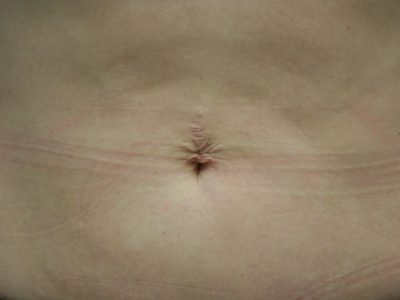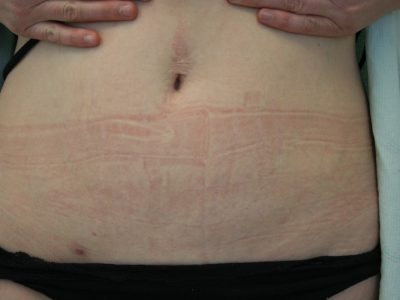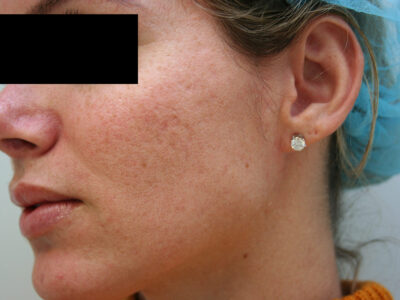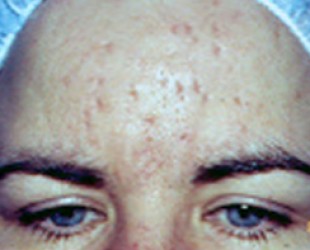How can scars be treated?
Depending upon the color, texture, and age of the scar, several different lasers can be used to improve scars. There is no treatment available at the present time that can remove the scars completely, but they can be improved. If the scars are red and/or raised we treat them with Pulsed Dye Laser, if they are old and white, we treat them with Fractional lasers and if they are bulky, they can be treated with ablative resurfacing lasers, i.e. CO2 or Erbium: YAG laser.
Dr. Khatri explains laser scar treatment in depth, then depicts an example of one type of scar treatment.
– SLSC Patient
What is laser scar treatment?
At Skin & Laser Surgery Center, we use different lasers to reduce the appearance of scars on our patients. The laser energy can work to improve scars in two ways, by removing the outer layer of the skin’s surface or by stimulating the production of new collagen and skin cells to replace the damaged skin cells. These treatments cannot completely remove a scar, but they can dramatically improve its appearance. What you’re really doing is replacing one scar with another. But the new scar should form with a more uniform structure and less visible difference from the surrounding skin.
Schedule a Consultation
To learn more about scar treatment, please contact us today at (617) 381-1717 or send us a message below to schedule a consultation.
Scar Treatment Before & After






What Causes Scars?
Any time human skin is cut or damaged, a scar will likely form. The body begins the process of repairing the wound by first creating a scab. This stems the bleeding and protects the wound from germs. As the skin heals, the scab eventually falls off. The skin underneath the scab may or may not be exactly the same color as the surrounding skin.
Scar tissue is composed of the same protein (collagen) as the tissue it is replacing, but the fiber composition is different. Instead of the basketweave formation of the collagen fibers found in normal skin, in a scar, the collagen tends to align in a single direction. This creates inferior tissue functionality. Scars are less resistant to UV radiation, and sweat glands and hair follicles do not grow back on scar tissue.
Laser energy can improve the appearance of a scar by removing the outer layer of the damaged skin’s surface, smoothing it, and improving tone and texture. Lasers can also target the blood vessels in the scar tissue to reduce redness. And they can penetrate the scar’s surface to stimulate the production of new collagen and skin cells.
Who is a candidate for laser scar treatment?
Just about anyone with a scar they don’t like is a good candidate for these non-invasive treatments. The only exceptions would be patients who are taking any medications that can cause light sensitivity. Patients also cannot be taking blood thinners, as this increases the risk of bleeding. You cannot have an active skin infection. Patients with darker skin tones have to weigh the possibility that the laser energy can cause hyperpigmentation at the scar site.
How are different lasers used for scar treatment?
During your consultation with Dr. Khatri, after he examines your scar, he will recommend the approach he thinks will best fit your situation. He may use a pulsed dye laser, a fractional laser, a CO2 laser, or erbium: YAG laser.
- Ablative or laser resurfacing — Here, Dr. Khatri will use a CO2 or YAG laser to remove the outer layer of skin from the scar. This eliminates the skin cells that have been damaged at the skin surface. They will be replaced with healthier cells that match the surrounding skin more uniformly. CO2 lasers are better for deeper scars, while erbium: YAG lasers are better for surface scars.
- Fractional laser resurfacing — This method of laser treatment has become popular for aesthetic skin improvement. The same principles work to improve the appearance of scars. Here, the laser energy penetrates the epidermis layer, creating tiny channels down into the dermis, the skin’s second layer. When the laser energy enters the dermis, it converts to heat. Whenever the body senses heat in the dermis layer, it assumes a wound has occurred. This triggers a “wound-healing response,” although the microscopic channels actually fully heal in just a few hours. The response is for the body to ramp up the production of collagen and elastin to heal the perceived wounds. This improves the skin from within, improving the scar appearance.
- Non-ablative laser resurfacing — These are the least aggressive laser scar treatments. Here the laser energy is set to penetrate the epidermis and enter the dermis, triggering the same wound-healing response described above. But due to the lower levels of energy, the effect is much less dramatic, and more treatment sessions will be needed to achieve the same results.
How will I know which laser treatment will be best for my scar?
Dr. Khatri has over a quarter-century of practice experience in dermatology and the use of lasers to address various skin issues. Once he examines your scar, he will recommend the laser and the method that will be most effective in reducing the appearance.
Will I need multiple laser scar treatments?
These are usually single treatments. You are basically creating a new scar in place of the old one. The thinking is that the new skin will grow more uniformly and be much less visible. Some scars are more stubborn, and deep, and may need more than a single treatment.
Is laser scar treatment painful?
These are not painful treatments. Depending on your scar and its location, Dr. Khatri will either inject local anesthetic or apply topical numbing cream prior to your session. This eliminates any pain. There can be some mild discomfort at the scar location for a few hours after your treatment, but this can be managed with a cold compress and over-the-counter medication.
Are there risks involved with laser scar treatment?
These are low-risk treatments. Remember that the goal is to encourage the skin to replace the damaged scar tissue with new skin cells. These are possible side effects:
- Minor bleeding
- Discomfort
- Skin infection
- Skin crusting
- Skin discoloration (hyperpigmentation)
- Swelling
“Dr Khatri and his staff are excellent. I have had numerous skin procedures taken care of by Dr Khatri, his expertise , professionalism and kindness is the best. I would highly recommend Dr Khatri and The Skin and Laser Surgery Center of New England to anyone .”
– D.L.
“Dr.Khatri is amazing. He is very knowledgeable and has many years of experience as a doctor. He has traveled all over the world which has exposed him to a wide variety of clinical studies. He’s an expert in his field and is very professional. The staff is very friendly & attentive. Beautiful office, very clean.”
– K.T.
“My experience at Skin & Laser Surgery Center has been excellent starting with very professional, friendly and caring staff followed by a thorough consultation and well explained treatment by Dr. Khatri. I would love to recommend skin related treatments at this center.”
– M.H.
